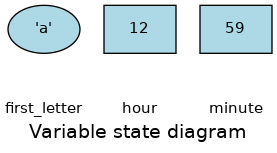2.4. Assignment¶
Now that we have created some variables, we would like to store values in them. We do that with an assignment statement.
first_letter = 'a'; // give first_letter the value 'a'
hour = 11; // assign the value 11 to hour
minute = 59; // set minute to 59
This example shows three assignments, and the comments show three different ways people sometimes talk about assignment statements. The vocabulary can be confusing here, but the idea is straightforward:
When you declare a variable, you create a named storage location.
When you make an assignment to a variable, you give it a value.
Note
We could have created these 3 variables llike this:
// These storage locations are defined,
// but there is no value stored yet!
char first_letter;
int hour;
int minute;
// perhaps we try to read a value from one of our
// three variables here?
int next_hour = hour + 1; // This is an error
char first_letter = 'a'; // give first_letter the value 'a'
int hour = 11; // assign the value 11 to hour
int minute = 59; // set minute to 59
Using unitialized variables is a commonn source of error. That’s why in C++ it is considered a best practice to always initialize a new variable with a value, if possible.
A common way to represent variables on paper is to draw a box with the name of the variable on the outside and the value of the variable on the inside. This kind of figure is called a state diagram because is shows what state each of the variables is in (you can think of it as the variable’s “state of mind”). This diagram shows the effect of the three assignment statements:

I sometimes use different shapes to indicate different variable types. These shapes should help remind you that one of the rules in C++ is that a variable has to have the same type as the value you assign it.
Warning
The variable type that you declare must match the type of the value assigned to it. A type mismatch will generate a compile error.
For example, you cannot store a string in an int variable. The following
statement generates a compile error.
int hour;
hour = "Hello."; // WRONG !!
This rule is sometimes a source of confusion, because there are many ways that you can convert values from one type to another, and C++ sometimes converts things implicitly (automatically). But for now you should remember that as a general rule variables and values have the same type, and we’ll talk about special cases later.
Another source of confusion is that some strings look like integers, but they are not. For example, the string “123”, which is made up of the characters 1, 2 and 3, is not the same thing as the number 123. This assignment is illegal:
int minute = "59"; // WRONG!
Q-1: A(n) statement gives a value to a variable.
- Change the type of variable q from int to char.
- Yes, but take a look at variable p.
- Change the type of both variables (p and q) from int to char.
- Both variables are a character surrounded by single quotes, so they should be type char.
- Change the type of variable p from int to char.
- Yes, but take a look at variable q.
- Nothing needs to change! The code will work just fine!
- This compiles and runs, but the code is not quite right.
Q-2: What must be changed in order for this code block to work?
// main: generate some simple output
int main () {
int p;
int q;
p = 'h';
q = '9';
}
You love your car, and you decide to keep track of its make, model, and year. You do so using three assignment statements IN THAT ORDER. For the sake of this problem, suppose you drive a 2001 Jeep Cherokee. Hint: there are a couple ways to write an assignment statement.
More to Explore
From cppreference.com
C++ identifiers and type